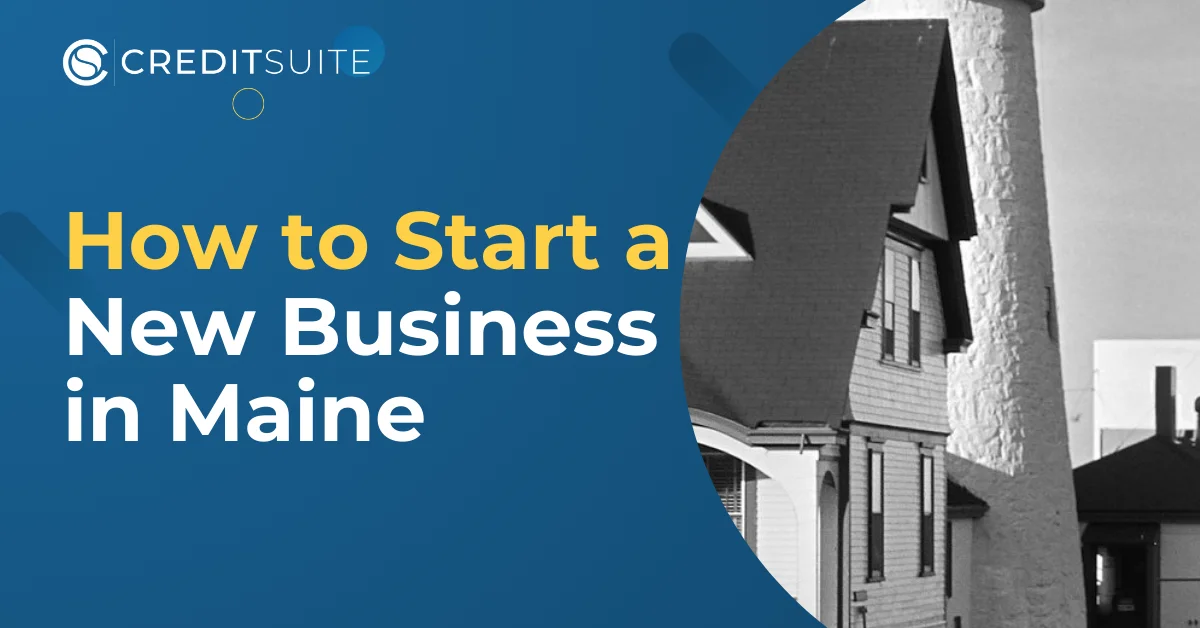Starting a Business in Maine
A new business in Maine is in reach. So have you been wondering: just how do I start a business in Maine? And more importantly, can I do so no matter what the economic conditions are? Can I start a new business in Maine during a recession?
New Business in Maine: Pros and Cons
Business Insider called Maine the second worst state to start a new business in, according to a 2016 article. And this is for the entire nation. There was a low density of startup companies and low productivity numbers. Its $37,958 GDP per capita is the seventh lowest in the country. Maine’s remoteness does not help, either.
Recent Confusing Metrics
In 2018, Forbes essentially agreed, placing Maine at a dismal 48th. And CNBC, in 2022, agreed, and named Maine to its #43 spot.
So what gives?
First of all, keep in mind that all three sites are using different methodologies. Plus, these are for different years
So let’s start with the good news. Per CNBC, Maine is number two for life, health & inclusion! But that is as good as the news gets, as Maine doesn’t get above #19 (for business friendliness) for any of CNBC‘s other metrics.
And now the bad news.
CNBC also put Maine at a dismal #49 for infrastructure. Workforce, cost of doing business, technology & innovation, and access to capital all circled the drain, in the 40s.
Forbes places Maine at dead last when it comes to its regulatory environment. And Maine does poorly for growth prospects, business costs, and economic climate. It scored below average for quality of life and labor supply as well.
Why did Maine come out on both ends of the spectrum for quality of life metrics? This can be a somewhat subjective measurement. Only you can decide if Maine’s remoteness and climate suit or stifle you. It would appear it’s not too expensive to start up a business. But it seems expensive to maintain one.
New Business in Maine: Programs
Funding assistance is available to most sizes and kinds of Maine business. The state has several programs which offer what it calls “comprehensive incentives.” These programs include progressive tax reimbursement policies. They also include a nationally recognized “Community Development Block Grant” program. The program provides funds to projects like infrastructure development
Pine Tree Development Zone Program
The “Pine Tree Development Zone” (PTDZ) program offers eligible businesses the opportunity to virtually eliminate state taxes for up to ten years. The goal is to create quality jobs and support new or relocating Maine businesses.
Targeted industries include environmental tech, biotechnology, and composite materials. They also include precision manufacturing, information technology and financial services. Benefits from the PTDZ include insurance premium tax credits, and corporate income tax credits. They also include payroll and property tax credits, income tax reimbursement, etc.
Three Ring Binder Program
Maine’s “Three Ring Binder” is the state’s $32 million public and private collaboration. It is between Pioneer Broadband, Great Works Internet, and the University of Maine system. The idea is to create an open access fiber optic network. It is to extend into rural and disadvantaged areas of the state.
Maine right now is in first place for high speed broadband intensity. And it is seventh place for high speed broadband availability. Newly installed 1,100 miles of fiber optic cable should enhance the state’s health care system. It should also positively impact academia and small business. The most profitable business in Maine might turn out to be in the tech industry.
Here is precisely how to start a new business in Maine.
Start a New Business in Maine – Maine New Business Secretary of State Requirements
How to Start a Business in Maine and Register a Business Name
The Maine government website says it is not necessary to register a trade name in Maine.
A Maine corporation must have a unique corporate name for the business. Before a business owner can file to incorporate, they should check to be sure that the name they want is not already in use by another corporation.
Search online records and government databases to find out if a name is already in use by another corporation. To search a database of Maine corporations, visit at the official website of the Maine Secretary of State.
While not necessary, a business owner can still apply to reserve a corporate name until they can file to incorporate. The application is online on the official website of the Maine Secretary of State. There is a $20.00 filing fee and the name will then be reserved for 120 days.
Starting Your Own Business in Maine? Better Check for State Business Permits and Licenses
The Maine government website will be your best bet. It includes a list of licenses you might need.
Opening a Business in Maine? Check if You Need Any Local Permits and Licenses
When starting a business in Maine, check for any local licensing or permit requirements.
For example, in Bangor, go to the Business Licenses page on the Bangor city website.
Start a New Business in Maine – Business Registration
Go to the Maine Bureau of Corporations, Elections and Commissions, by way of the Department of Secretary of State. They have the requisite forms.
Tax Registration for a Small Business in Maine
Go to the Maine Revenue Services to use their registration service.
Start a New Business in Maine – Virtual Offices
Alliance Virtual Offices offers Maine virtual office space in Portland. Regus does not offer Maine virtual office space. DaVinci offers Portland virtual business office space. Opus has Waterville virtual business offices. An extensive search did not turn up any Maine virtual office addresses in Augusta, Bangor, or Caribou.
Therefore, business owners looking for virtual business offices in these metropolitan areas should connect with local business owners.
Or they can try computer user groups for leads in this area. Other options may include finding virtual business office space in nearby states. These are Massachusetts, New Hampshire, and Vermont.
Start a New Business in Maine – Establish Business Credit
Small business credit is credit in a company’s name. It doesn’t connect to an owner’s individual credit, not even if the owner is a sole proprietor and the only employee of the business.
Accordingly, a business owner’s business and consumer credit scores can be very different.
The Benefits
Because business credit is independent from personal, it helps to secure an entrepreneur’s personal assets, in case of court action or business bankruptcy.
Also, with two distinct credit scores, a business owner can get two separate cards from the same vendor. This effectively doubles buying power.
Another advantage is that even startup businesses can do this. Going to a bank for a business loan can be a formula for frustration. But building business credit, when done right, is a plan for success.
Consumer credit scores depend on payments but also various other elements like credit usage percentages.
But for small business credit, the scores really only hinge on whether a company pays its debts on a timely basis.
Start a New Business in Maine – Small Business Fundability™
A business needs to be Fundable to lending institutions and vendors.
That’s why, a business will need a professional-looking web site and email address. And it needs to have website hosting from a hosting provider.
Additionally, the business phone number should be toll-free (800 exchange or comparable).
A company will also need a bank account devoted only to it, and it must have every one of the licenses essential for operating.
Dealing with the IRS
Visit the IRS web site and get a free EIN for the company. Select a business entity like corporation, LLC, etc.
A business can start off as a sole proprietor. But they should change to a form of corporation or an LLC. This is to limit risk. And it will optimize tax benefits.
A business entity will matter when it concerns taxes and liability in case of a lawsuit. A sole proprietorship means the business owner is it when it comes to liability and tax obligations. No one else is responsible.
Setting off the Business Credit Reporting Process
Begin at the D&B website and get a free D-U-N-S number. A D-U-N-S number is how D&B gets a business in their system, to produce a PAYDEX score. If there is no D-U-N-S number, then there is no record and no PAYDEX score.
Once in D&B’s system, search Equifax and Experian’s sites for the business. You can do this at www.creditsuite.com/reports. If there is a record with them, check it for correctness and completeness. If there are no records with them, go to the next step in the process.
By doing this, Experian and Equifax will have something to report on.
Vendor Credit
First you need to build trade lines that report. This is also referred to as vendor credit. Then you’ll have an established credit profile, and you’ll get a business credit score.
 And with an established business credit profile and score you can start to get more credit.
And with an established business credit profile and score you can start to get more credit.
These accounts tend to be for things bought all the time. Like shipping boxes, outdoor work wear, and office furniture.
But first of all, what is trade credit? These trade lines are credit issuers who will give you initial credit when you have none now. Terms are typically Net 30, versus revolving.
So, if you get an approval for $1,000 in vendor credit and use all of it, you will need to pay that money back in a set term, like within 30 days on a Net 30 account.
You want 3 of these to move onto more credit.
Start a New Business in Maine – Monitor Your Business Credit
Know what is happening with your credit. Make certain it is being reported and attend to any inaccuracies as soon as possible. Get in the practice of checking credit reports. Dig into the details, not just the scores.
We can help you keep track of your business credit at major CRAs for considerably less.
Update Your Data
Update the info if there are mistakes or the data is incomplete.
Start a New Business in Maine – Fix Your Business Credit
So, what’s all this monitoring for? It’s to dispute any problems in your records. Mistakes in your credit report(s) can be fixed. But the CRAs typically want you to dispute in a particular way.
Disputes
Disputing credit report inaccuracies usually means you precisely detail any charges you challenge.
A Word about Building Business Credit
Always use credit responsibly! Don’t borrow more than what you can pay back. Keep track of balances and deadlines for repayments. Paying promptly and in full will do more to raise business credit scores than almost anything else.
Establishing company credit pays off. Good business credit scores help a small business get loans. Your lender knows the business can pay its debts. They know the business is for real.
The small business’s EIN connects to high scores and credit issuers won’t feel the need to require a personal guarantee.
Business credit is an asset which can help your business for years to come.
Learn more here and get started toward opening a new business in Maine.
Want to start a new business someplace else in America? Then check out our handy guide to starting a business in any state in the country.
Maine’s Response to COVID-19
Maine is taking action as well. On March 17, Governor Janet Mills and the Maine Department of Health and Human Services (DHHS) took immediate steps to ensure access to critical services and benefits for Maine people, while protecting the health of employees and the public in response to COVID-19.
First, MaineCare will waive all copays for prescriptions, office visits, emergency department visits, radiology and lab services. Also, all Bureau of Motor Vehicles offices are closed until further notice.
In addition, the SBA has approved Maine’s March 16 application for SBA Economic Injury Disaster Loans to help Maine businesses overcome any temporary loss of revenue due to COVID-19.

